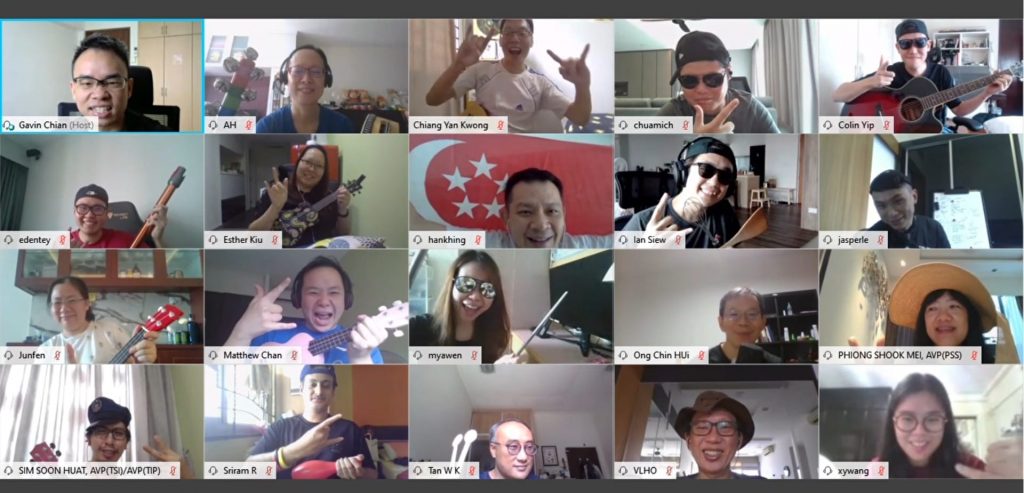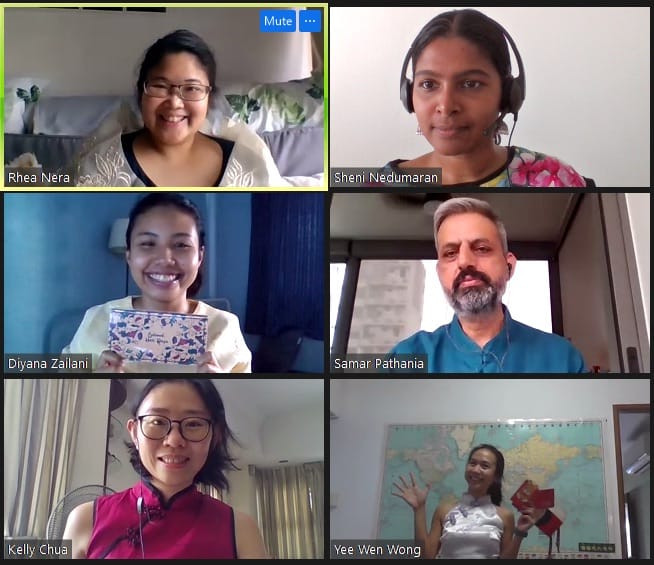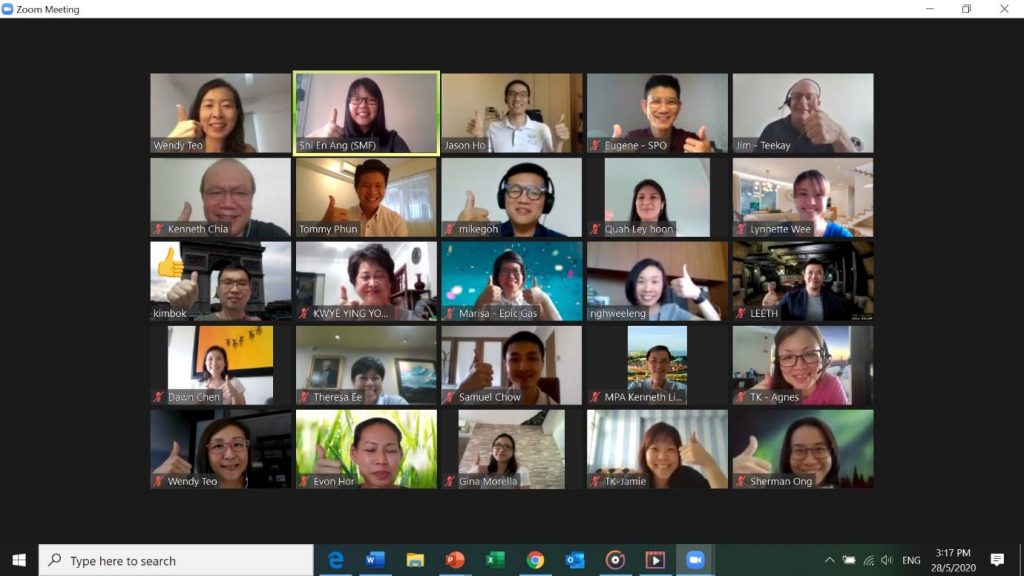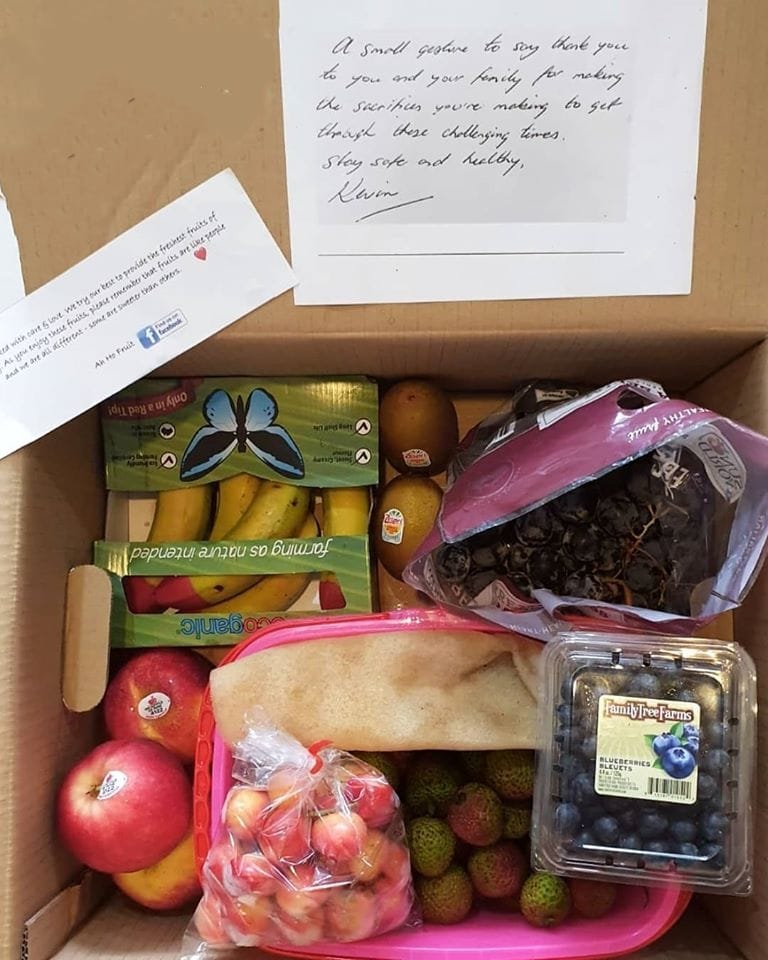(Photo: One of PSA’s virtual team bonding sessions)
This shift in focus is partly made possible with new and emerging technology. Just as how technology has introduced profound changes to fields like finance and operations, it has also benefitted the field of HR, allowing it to demonstrate its business value.
“Digitalisation has allowed us to work more effectively,” said Mr Jim Basterfield, Director of Human Resources at Teekay Tankers. “For example, an increase in self-services reduces HR administration, thus allowing us to spend more time on value-added initiatives such as employee engagement and development.”
Though the maritime industry has already begun its digitalisation journey, the COVID-19 pandemic drove the world into a new era of business and accelerated the take up of digital tools in maritime organisations – all in a short span of time.
“The COVID-19 pandemic has, somewhat counterintuitively, led to improvements in global connectivity across office locations and ship to shore,” shared Ms Eleana Choy, Global Head of HR at The China Navigation Company (CNCo). “The restrictions caused by the pandemic have acted as a catalyst for widespread implementation of existing digital tools such as Teams and Zoom. I believe that virtual activities such as meetings, workshops, inspections and audits would further develop and become a regular part of the working landscape.”
The pandemic has not only propelled an industry-wide digital transformation, but workplace transformation as well, as companies leverage technology to ensure their businesses continue to run smoothly. HR is essential to supporting employees during this transition, especially for those unaccustomed to such digital practices.
“We have embarked on a series of ‘Future of Work’ initiatives where we look ahead, prepare our workforce to be in a stronger position in the ‘new normal’. While the adoption of new technologies is central to these initiatives, reshaping mindsets is equally crucial for us to make changes with agility,” shared Mr Ng. “We have devoted considerable efforts and resources to level up every staff to be more conversant in using digital tools. Many of our frontline staff who are less digital savvy are now participating in e-learning and virtual classrooms-type training using digital technologies.”
Other challenges arising from this new working environment include changing expectations from management, growing disconnect from colleagues and blurring of work-life balance. Employees require the right support to stay engaged and motivated, with a renewed focus on their mental and emotional wellbeing, even as companies strive to provide undisrupted services.
“We are ramping up our staff engagement using digital means, by piloting virtual team bonding activities and rolling out practical tips for more effective connections online,” said Mr Ng.
“Our employees have remained connected at the local, regional and global level whilst working from home, balancing business requirements as well as social needs, including fun online activities such as Happy Hour,” Mr Basterfield added.
“There is additional emphasis on staff safety, emotional and mental wellbeing, changes in working norms and development of policies and guidance that support best practices and ensure regulatory compliance,” said Ms Choy. “Aside from online social activities, we have encouraged colleagues to bond by introducing their family members and pets during online meetings. The best way to work from home is by embracing the home environment rather than pretending it is not there.”
(Photo: CNCo’s Employee Action Group meeting in their cultural best. The group focuses on building a vibrant community around the world, leveraging on its rich cultural and geographical diversity.)
In organisations with a diverse workforce, HR leaders have to be aware and conscious of the varied needs of employees through maintaining continued interactions to best understand how to meet these needs.
“Our HR team has been purposeful in reaching out to every employee bi-weekly to check in with them and their families on a personal level, rather than just on a work-related basis, to make sure they are coping amidst these challenging times,” shared Mr Basterfield. “It is important to go beyond what technology can provide in terms of interaction and demonstrate we really care about our people.”
“Our regular online townhalls reach out to employees across all locations globally and have provided not only an opportunity for management to deliver key messages but also for employees to raise their concerns, either in person or anonymously,” Ms Choy added.
While those onshore have been impacted by the pandemic, these challenges are also extended to those at the frontline, both at the port and onboard vessels. Furthermore, stringent restrictions that have prevented crew change have created feelings of isolation and anxiety among seafarers onboard.
For both CNCo and Teekay Tankers, providing additional allowances and increasing data allowances for seafarers unable to sign off, as well as providing salary to support those unable to sign on are some of the ways they have helped seafarers cope in the face of such difficulties.
While maintaining communication is key to ensuring employees remain abreast of developments and connected despite these changing situations, providing a network for HR leaders to draw insights and support from can benefit their work processes. The Circle of HR InnOvators (CHRO) network, set up by the Maritime and Port Authority of Singapore (MPA) and the Singapore Maritime Foundation (SMF), was thus created for this purpose.
“Although the CHRO network is still in its infancy, it is helpful as HR leaders can learn from each other’s successes and challenges, and subsequently implement best practices in their respective organisations,” said Mr Basterfield.
As the industry navigates these challenging times, having a platform for maritime HR to exchange learning points also provided guidance in addressing challenges that accompanied the pandemic.
“The CHRO network has enabled HR practitioners to share and exchange useful information for us to act in a timely and effective manner amidst COVID-19,” shared Mr Ng.
“Such sharing has been beneficial in coping with the current situation,” Ms Choy added.
(Photo: Members of the CHRO network meeting virtually amidst COVID-19)
Against the backdrop of the COVID-19 pandemic, the global economy will remain under pressure, bringing fundamental changes to business models and working arrangements, amongst others. HR will continue to play an essential role in helping their organisations change the way they think about work, and ensuring continued transformation in the workplace.
“HR leaders need to stay abreast with the business developments, view all possibilities and challenge our perceptions to rethink workforce planning, management and performance strategies,” Mr Ng pointed out.
Ms Choy also added that attitude shifts and changes in expectations should take place across management teams.
“Companies will need to develop managers with the skills and aptitudes necessary to run remote teams, placing greater emphasis on leadership, employee engagement and management of results than on micromanagement of actions,” she said.
Building a resilient workforce with the right skillsets is also important, especially as COVID-19 reinforced the importance of digital transformation to business success.
“With the industry continuing its relentless digital march, the ability to manage information and to analyse data will be of increasing relevance,” shared Ms Choy. “This includes digital literacy, information agility and analytical skills.”
Yet there are some fundamental traits that organisations are always on the lookout for.
“Flexibility, willingness to adopt change and commitment are some of the core behaviors that employers seek,” said Mr Basterfield.
In addition to hiring talent with the right skillsets, Mr Ng shared that robust job design coupled with upskilling and multiskilling employees should also be a priority to ensure a more agile workforce in the long run.
On retaining talent, Ms Choy stressed the importance of going beyond providing stable jobs.
“Successful companies will need to do more than simply provide stable jobs, they must equip employees with the skills they need to thrive in the industry even as specific roles change or disappear,” said Ms Choy. “They must also provide opportunities for their employees to make progress in their careers using these skills.”
Fundamentally, people should remain the core focus of any organisation.
“Compassion and instilling a sense of community should be immediate priorities in the new normal,” said Mr Basterfield. “HR practitioners need to trust, care and invest in their employees, in order to have a continued positive impact on their organisations’ culture.”
(Photo: Fruits delivered to employees and their families during COVID-19, accompanied by a handwritten note from Mr Kevin Mackay, CEO of Teekay Tankers)
While it is important for maritime organisations to remain resilient and adaptable, recognising HR as a strategic partner is central to their success. As the world reflects on 2020 in the future, organisations will be assessed not only on their ability to ensure business continuity, but also how they had supported their employees through these extraordinary times.









